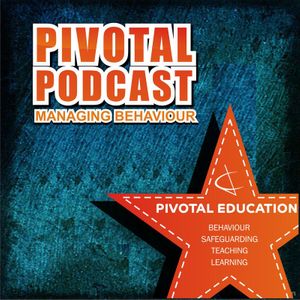Hannah Wilson on #WomenEd and How to Promote Equality – PP113
Pivotal Podcast - A podcast by Pivotal Education

Categories:
We were joined today by Hannah Wilson who is co-founder of the #WomenEd movement. She is also a CPD Consultant, an SLE, a facilitator, a coach and an events organiser! Over the years, Hannah has picked up curriculum, pastoral, whole-school and cross-schools responsibilities. She became assistant principal and has led on cross-curricular strands in a variety of settings including across her Multi-Academy Trust. She started an NPQH last term. Hannah feels it’s a very exciting time to be in educational leadership because the range of opportunities is much greater than in the past. Do we need #WomenEd because the men have messed it all up? Hannah believes the problem is the system – and the system is all of us in society. There are still many institutionalised practices, even though it’s the 21st Century. We are in a time of equality, flexible working and innovative technology but some schools are still run like they are back in the Dark Ages. #WomenEd came about because suddenly last Easter a lot of Twitter activity, blog posts and people aligning themselves around a common vision happened. In a profession where we have a female-heavy workforce, why, when we look up, do we see white men? White men do not represent the workforce, they don’t represent the community the school serves. The movement is not anti-white men – they are asking why it is that a certain type of leader keeps getting promoted and others don’t have quite as easy a ride into those senior roles. #WomenEd is about empowering and connecting people – to help them grow in confidence and make contacts. Hopefully this will lead to more women seeing those leadership roles as a viable option for them. A lot of people want the movement to have a quantitative measure but Hannah is clear that they are not, for example, trying to get more women into headship. They are a set of people who all want to see a change and together they can articulate what that change should be. There has already been a lot of success. #WomenEd are in the Education White Paper, they are have a weekly column in the TES and they have CEOs of big organisations and companies approaching them to work with them to create events. They are just trying to create a connecting web where they pull together all the collaborative networks that already exist for the better of everyone. Are #WomenEd events just for women? No they are not, says Hannah. There have been men at every big event and they consider themselves to be very inclusive. It’s not men against women, everyone needs to be working with each other to effect change. How are women affected by unconscious bias in the workplace? ‘Presenteeism’ is a problem. Leaders and teachers are rewarded for being present but some groups like those who are on maternity leave, on long-term sickness leave or have to work flexibly because of caring responsibilities, being present is much more of a challenge. There is also a ‘personal glass ceiling’ you can put on yourself: When a man looks at a job specification he sees what he can do but when a woman looks, she sees what she can’t do. This ‘imposter syndrome’ can hold women back. This is also exacerbated by taking time out. The curriculum and the educational system changes so rapidly that it’s easy to be left behind. It affects your confidence which then affects your mental and emotional health when you come back. Governors also need to careful of unconscious bias. In a lot of schools, flexible working is used purely as a retention tool – to persuade women to come back after a break, for example. In the best examples, flexible working is available more generally and is used positively. Is there data around these issues? Data is collated for headteachers but not for assistant and deputy heads ...